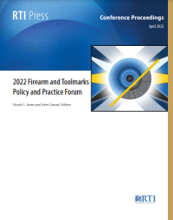Community justice
Modified Firearm Discharge Residue Analysis utilizing Advanced Analytical Techniques, Complexing Agents, and Quantum Chemical Calculations
Recidivism Reconsidered: Preserving the Community Justice Mission of Community Corrections
Integrated Health Care and Criminal Justice Data Viewing the Intersection of Public Safety, Public Health, and Public Policy Through a New Lens: Lessons From Camden, New Jersey
Early Representation by Defense Counsel Field Test - Final Evaluation Report
Women's Experiences of Social Reactions From Informal and Formal Supports: Using a Modified Administration of the Social Reactions Questionnaire
Desistance From Crime: Implications for Research, Policy, and Practice
Most scholars would agree that desistance from crime – the process of ceasing engagement in criminal activities – is normative. However, there is variability in the literature regarding the definition and measurement of desistance, the signals of desistance, the age at which desistance begins, and the underlying mechanisms that lead to desistance. Even with considerable advances in the theoretical understanding of desistance from crime, there remain critical gaps between research and the application of that research to practice.
See the YouTube Terms of Service and Google Privacy Policy
Juvenile Justice Responses to the COVID-19 Pandemic Crisis: Responses, and Opportunities for Reform
Reducing Youth Incarceration for Runaway and Truancy: A National Scan of Practice and Evaluability Assessments in Three Sites
Effects of storage time on DNA profiling success from archived latent fingerprint samples using an optimised workflow
FIU - Forensic Technology Center of Excellence
Forensic Technology Center of Excellence, Fiscal Year 2021
Alternatives to Traditional School Discipline - Breakout Session, NIJ Virtual Conference on School Safety
On February 16-18, 2021, the National Institute of Justice hosted the Virtual Conference on School Safety: Bridging Research to Practice to Safeguard Our Schools. This video includes the following presentations:
See the YouTube Terms of Service and Google Privacy Policy
Multi-Component Efforts to Improve School Safety - Breakout Session, NIJ Virtual Conference on School Safety
On February 16-18, 2021, the National Institute of Justice hosted the Virtual Conference on School Safety: Bridging Research to Practice to Safeguard Our Schools. This video includes the following presentations:
See the YouTube Terms of Service and Google Privacy Policy
National Institute of Justice 2018 Annual Report
NIJ and FBI Laboratory Partnership to Address Untested Sexual Assault Kits
NIJ and FBI Laboratory Partnership to Address Untested Sexual Assault Kits
Expanding Research to Examine the Impacts of Forensic Science on the Criminal Justice System
In 2004, the National Institute of Justice created the social science research on forensic sciences (SSRFS) research program to explore the impact of forensic sciences on the criminal justice system and the administration of justice. Much of the early research from the SSRFS program focused on DNA processing and the use of DNA in investigations and prosecutions.
See the YouTube Terms of Service and Google Privacy Policy


